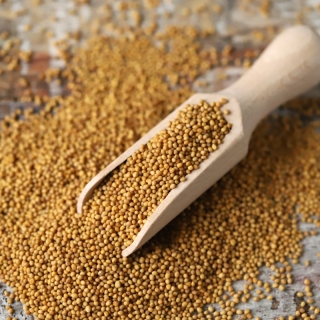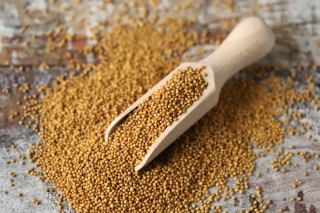White mustard (Sinapis alba) is an annual plant that belongs to the cabbage family (Brassicaceae). This multi-purpose plant is characterized by high growth rate. A fully developed plant grows about 60 centimetres tall. It takes on an erect habit and develops a branched stem covered with pinnatisect leaves. The yellow flowers appear on the plants from end of May until August. White mustard blooms are eagerly visited by pollinating insects. The plant is melliferous.
The seeds that we offer here can be used for growing animal fodder and as high quality aftercrop. White mustard green matter is recommended for feeding rabbits. Silage and green fodder can be successfully fed to cattle. White mustard is also used as a support plant in pea and vetch cultures. This excellent aftercrop improves the phytosanitary conditions of the soil. It impairs development of dangerous diseases and pests. It is recommended for reducing the population of nematodes, particularly the sugar beet nematode. White mustard is also an excellent green fertilizer. It stands out with high and quick growth of green mass and can be ploughed in 50 to 70 days after the sow. It improves the soil quality and allows you to achieve higher yield of the successive crops.
Mustard is a rather undemanding plant. We recommend to sow its seeds onto loam and sandy-loam soils that are warm and contain humus. It will grow on lighter soils, provided they are not sandy. It requires a permeable soil with neutral reaction. The plants are able to use hardly available nutrients from the soil.
The optimal growing conditions for the white mustards are moderate late summer temperatures of August and September and sufficient amount of rainfall. Mustard will also germinate well in spring, sown from March to May. White mustard plants are hardy - the emerging seedlings handle temperatures down to -6⁰C and the flowering specimens down to -2⁰C.
We hereby offer unqualified seeds to be used for growing animal fodder and as an aftercrop. These high quality seeds have been carefully selected.
One package contains 1 kg of seeds.
- Height: 60 cm
- Use: animal fodder; aftercrop; green fertilizer; melliferous plant
- Blooming time: May - August
- Growth form: erect
- Flower colour: yellow
- Vegetation form: annual
- Foliage: pinnatisect
- Site: warm, sandy-loam or loam, permeable soil rich in humus
- Weight (in grams): 1 kg
GardenSeedsMarket - has been in business for more than a decade and from the very beginning we have made the quality of our products the top priority. Throughout the years we have delivered the best quality goods to tens of thousands of customers from all over the world. Their satisfaction proves that we had chosen the right way.
All seeds we sell are subject to a multi-level quality control checks and only then are carefully packed and dispatched. Our products have been awarded numerous certificates and comply with the highest standards of the European Union. Our employees are experienced gardeners who are more than happy to answer your every question.
Where do our seeds come from?
All of the seeds sold in our shop come from the best producers from across the European Union. Thanks to a long-standing cooperation with them we were able to develop the most adequate storing and dispatch conditions, guaranteeing that you always receive fresh and carefully tested batches of seeds. Exclusion of the middlemen from the whole process not only makes it possible for us to avoid sending out-of-date seeds that might have been lying too long on a warehouse shelf, but also ensures the most attractive price for top quality products.
The quality control process
All our seeds must pass a four-stage quality control process.
Stage one begins with a careful selection of the suppliers. Than we proceed with controlling their crops, foreign producers are not excluded from the quality control process. Plants are checked at every stage of their development: when they start to grow, during blooming and when they start bearing fruit (seeds). At this stage the most important thing is to ensure proper spacing of the plants. Thanks to that obtaining the desired morphological characteristics of each particular species or variety, such as colour, height and shape, can be ensured.
Stage two consists of a detailed verification tests in laboratory conditions. With the use of the highest quality equipment by the highly qualified staff, our suppliers perform more than 30 000 quality checks annually. The seeds that do not meet our requirements are subject to technological refining processes, including drying, cleaning, upgrading and testing again.
Stage three starts with sowing seeds in selected control plots. That way we obtain valuable, exact information concerning their germination that must be maintained at an appropriate level. Simultaneously, the varietal identity of each species is checked at this stage.
Stage four takes place in our warehouses and consists of eliminating seeds that have been stored for too long on our shelves and replacing them with new batches. Each package is stamped with a unique batch number and also with the sow-by-date.
All four stages combined allow us to state with confidence that the seeds we deliver comply with the highest standards and have completed all required control stages with flying colours.
Prizes and awards
The seeds we sell are widely recognized for their quality and have won many awards. Our seeds won numerous gold medals and distinctions for their high quality. The World of Flowers was also honoured for its innovative approach.
Among those awards there were: TOP INNOVATION (June 2015), GOLD MEDAL AT THE POZNAN INTERNATIONAL FAIR (2015), CONSUMER QUALITY LEADER (2014), FARMER OF THE YEAR (2014).
In addition, we have also been awarded the “IDEAL BUSINESS” certificate for two years in a row.
Germination
We are committed to selling only the highest quality seeds. Taking into consideration the efforts we make daily, please also note that plants are living organisms and their germination and growth depends on many factors, such as temperature, soil type, humidity and the frequency with that they are watered, sowing time and conditions, use of fertilizers and plant protection agents (pesticides), as well as weather and climate conditions. We provide help by sharing the accurate and up-to-date sowing and growing information, however, we cannot bear any responsibility for the plants that were not cultivated in conditions appropriate for given species.







